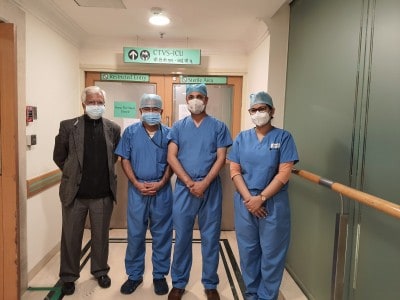New Delhi, Jan 5 : In a first, a 55-year-old Covid-19 patient successfully went through a keyhole chest surgery, which was performed for the first time in the country, at Max Super Speciality Hospital in South Delhi, the hospital said in a statement on Tuesday.
Sanjay Batra developed pneumothorax, a condition of collapsed lung, caused by the presence of air in the chest cavity (thoracic cavity).
The lung was trapped because of the formation of an inelastic peel over the lung surface, after recovering from the infection. This peel was not allowing the lungs to expand despite insertion of tubes in his chest cavity.
According to the hospital, the patient was so weak that it was impossible to go ahead with an open surgery.
“This is the first time ever a keyhole surgery of the chest for a collapsed lung was performed in India on a patient affected from Covid-19 infection,” said lead surgeon Shaiwal Khandelwal, Senior Consultant, at the Max Super Speciality Hospital.
The patient contracted Covid-19 in September and tested negative the following month.
“But a few days after his recovery from the infection and returning home, he started complaining of sudden onset breathlessness and was rushed to the nearby hospital and diagnosed with pneumothorax in the right lung. The patient underwent an emergency chest drain procedure of suctioning out air from his right chest cavity with the help of a tube with partial relief,” he informed.
The doctor decided to go ahead with Video-Assisted Thoracoscopic Surgery (VATS) (keyhole chest surgery), which was successful and the patient’s collapsed right lung started functioning the very next day and oxygen levels improved.
The right lung of the patient started expanding by the end of the VATS surgery when the patient was still on the operation table. His breathing capacity improved and the patient was discharged six days later without oxygen support, the hospital said.
The patient was well on the road to recovery.
VATS, which involves making tiny cuts over the chest wall and is performed with the help of special endoscopic cameras and instruments, also causes less pain, and allows for faster recovery.
Disclaimer: This story is auto-generated from IANS service.

